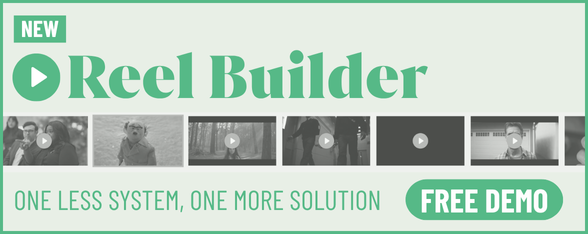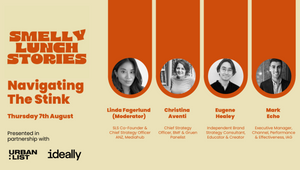
Christina Aventi Says CCO Diversity Requires “Strength and Conviction”, “Overcompensating” for Biases as BMF Continues Hunt

BMF CSO Christina Aventi said the agency’s current search for a CCO constitutes “a really complex” decision that involves taking into account “deeply systemic” biases.
In June, CCO Stephen De Wolf announced he was returning to Clemenger BBDO to take up the top creative job following its merger with CHEP and Traffik.
“There can be an unconscious bias when you're making decisions like this," she said, speaking on a Smelly Lunch Stories panel in Sydney yesterday centred on diversity and inclusion.
"You can feel it in really subtle ways in the conversations that you have with people – but you need to be really vigilant about that and not cave into it. That takes strength and conviction.
“You absolutely have to overcompensate for other people's biases in the system and in the chain of decision making to help create an environment where in your organisation, having a difference actually means you belong.”
Christina was joined by Eugene Healey, an independent brand strategy consultant; and Mark Echo, executive manager, channel, performance and effectiveness at IAG. ‘Navigating The Stink’ was held at Sydney’s Ace Hotel, and moderated by Smelly Lunch Stories co-founder, Mediahub’s Linda Fagerlund. Linda partnered with Dentsu Creative’s Graham Alvarez-Jarratt, BWS’ An Le, and Nunn Media’s Michelle Miroforidis to launch the initiative almost a year ago, in a bid to increase the diversity of the industry’s C-suite through the power of sharing stories and food.
The panel unpacked what discrimination looks like in the modern marketing and advertising industry, and what can be done to tackle it.
Recent Smelly Lunch Stories and Urban List research found 76% of people who identify as culturally or ethnically diverse in this industry say they've had to actively shrink themselves or downplay their cultural background in order to fit in. In addition, 31% have experienced discrimination in the past year, and 60% have experienced microaggressions.
Eugene pointed to a deeper, structural problem: the decoupling of social and economic progress. “That has a bearing on the reason that a lot of people are pushing back on DE&I policies now,” he said.
“If you’re a worker and you’re seeing housing in Sydney costs $1.7 million on average, there is an institutional anger and ferment there.”
Australia’s lack of economic diversity, he argued, causes Australia to be far more risk averse than other countries with similar resources.
“We have the 105th most diverse economy in the world, right between Botswana and the Ivory Coast. That economic lack of diversity causes this country to be incredibly risk averse. So what we do in this country is we want to stick to known, historical quantities.”
That conservatism filters down through industries and ultimately shows up in advertising. “It flows down to not only corporate culture, but it flows down to the media industry as well.”
Mark said that makes marketing and media’s role all the more important.
“Our industry is at the cornerstone of culture and commercial. That's where we live,” the IAG marketer said. “When two environments come together, that's innovation, that's where things are born.”
It’s why brands and agencies have the power to drive visible change, he added.
“DE&I, the ‘D’ part is so broad. It's not just cultural, it's not just race, religion, beliefs, and values. It's so much more broad than that.
“The corporate sector in our industry, in the marketing space and advertising, and all the money that flows through, there is enough money there to change opinions, to change the way that we are headed at the moment.
“We're at this cusp, and we need to make sure that we're constantly driving that forward.”
Mark helped his wife through a traumatic brain injury that resulted in short term memory loss and an eight-year career gap. He said that lived experience has made him passionate about expanding the conversation to include people with a disability.
“Disability is a form of diversity. It doesn't know borders. It doesn't know sexual preferences, gender, race. Everyone in this room – knocking on wood – is susceptible to it, and it could take less than three seconds for it to happen,” he said.
“We have to cater to more, because we can learn things from all these types of different differences that we have.”
Christina credited the influence of leaders like former BMF CEO and current Telstra exec, Jeremy Nicholas, and current BMF CEO Stephen McArdle on effecting change – “having mentors, even unofficial mentors, is really critical.”
She also believes in the power of perception – and if there is one thing this industry is good at, it’s making something desirable.
“The cynical part of me says, ‘Make it cool, brand it. Make being a champion of diversity aspirational’. I think that's a really cynical view, but you've got to do that … it’s important to brand it so that people strive for it on a different kind of level, and it's not just virtue signalling.”
Eugene addressed “talent that's coming through today” instead of business leadership.
“Be wary of devoting your time and your resources and your essential lifeforce to institutions of waning cultural and economic influence,” he said.
“We have fought for so long, kicking and screaming, to be included inside this tent, and that tent’s power is declining every year. They need us, not the other way around.”
His advice was, “Be nice to people, but be ruthless to institutions. Take every assurance that you're given as puffery, unless it is actually written down. Change jobs when those opportunities come up. Don’t ever assume that loyalty is something that's going to be paid off.
“Build your own personal brands that are independent of institutional brands. The worst thing that can happen is that you get leverage.”
Turning back to those in leadership, he offered a challenge: “It's your turn to prove yourselves to us, not the other way around.
“Pauline Hanson's right about one thing: It is actually our time. I would encourage you all to be as entitled as the mediocre white men that have run your departments up until this point.”












